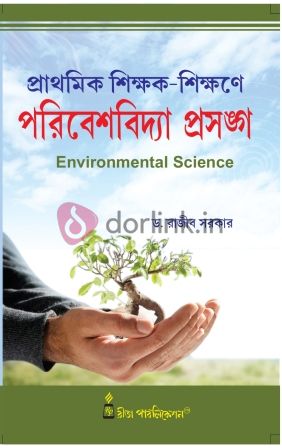Writer : Dr. Rajib Sarkar
- Shipping Time : 4 Days
- Policy : Return/Cancellation?
You can return physically damaged products or wrong items delivered within 24 hours with photo/video proof.
Contact Customer Support for return initiation and receive return authorization via email. Securely package for return.
Refunds for eligible returns are processed within 7-10 business days via Bank Transfer.
Order cancellation allowed within 24 hours of placing it. Standard policy not applicable for undamaged/wrong product cases. Detailed info. - Genre : Educational>D.El.Ed/B.Ed./M.Ed.
- Publication Year : NA
- ISBN No : NA
- Binding : No Binding Available
- Pages : NA
- Weight : NA
- Height x Width x Depth : xx Inch
If so, it will be notified
About the Book
Syllabus:
Unit 1: Basic Concept of EVS:
· Meaning, Nature and Characteristics of EVS.
· Process in EVS—representations, relations, reasoning, problem solving in day-to-day activities and communication in life skills.
· Goals of EVS Educations—Cognitive, affective and psychomotor domain.
Unit 2: Aims and objectives of EVS:
· Aims of Teaching EVS—Multi disciplinary, Utilitarian.
· Objectives of EVS in terms of Competencies/Learning outcomes in terms of contextualization, development of interest and appreciation.
Unit-3: Curriculum Construction of EVS Learning:
· Principles of Curriculum Construction
· Organization of Curriculum Construction.
Unit 4: Approaches and Methods for Teaching—Learning of EVS:
· Approaches—Transmission, Child—Centric, Discovery, Constructivism.
· Methods—Story telling, Observation, Discussion, Dramatization, Discovery, Local Field Study, Demonstration, Problem-solving, Project, Experimentation.
Unit-5: Resource and Materials for Teaching—Learning EVS:
· Preparation and use of Teaching-Learning—Materials (LTM) in EVS.
· Use of Local Resources in EVS Learning
· Organizing Resource Rooms in Schools for preserving Audio-Visual Teaching Aids (ET Lab)
· Organizing Library for preserving Text Books, Teachers—Hand Books, Reference Books and some periodicals.
· Organizing Laboratory as Science resource room.
Unit 6: (Knowledge) Critical analysis of the Contents of EVS meant for class I to V.
Unit 7: (Knowledge) Critical analysis of the contents of EVS meant for class VI to VII
Unit 8: Lesson Planning of EVS Learning.
· Unit and Sub-Unit based Lesson Planning (Micro and Macro), preparation of lesson notes on the basis of competencies (Micro)
· Maintaining Note Books (Micro & Macro) for evaluation of lesson plan along with Work-Sheet with each and every Lesson Plan.
Unit-9: Action Research
· Action Research for improvement of Teaching—Learning of EVS
· Preparation of Project
Unit 10: Learning Assessment in EVS:
· Tools and Techniques of Evaluation
· Construction of Achievement Test
Knowledge of CCE in EVS

